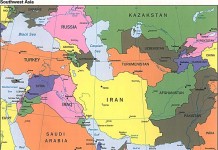Context
 Turkish and Persian Dimension
Turkish and Persian Dimension
Recent developments in the relationship between Turkey and Iran point toward an emerging shift in the Middle East balance of power. For the most part these ties have been of socio-economic nature. For example, on October 28th Iran and Turkey signed an agreement for the joint exploration and production of gas from Iran’s South Pars field, with a total investment of $4 billion and a future prospect of Iran becoming a supplier to the Nabucco energy project.
Now an Israeli website reports that these relations are extending into the realm of military and intelligence cooperation. This development is coming at a peculiar time, as Iran is worried about the threat of an Israeli attack due to its nuclear ambitions. This is alarming news for Israel, as it has long maintained a political and military relationship with Turkey. If indeed such an agreement has taken place between Iran and Turkey, it will surely occur at the expense of Turkey’s relationship with Israel.
Turkey has been taking on an increasingly assertive posture in regard to the role of Israel in the Middle East, particularly in the aftermath of the Winter 2008-2009 Gaza Conflict. However, Turkey has also been serving as a conduit between the West and Iran, in matters related to Iran’s nuclear ambitions. Turkey has also played a facilitator role for the US and Israel in talks related to Syria. Something is changing in the political dynamics of Middle East, with the Middle East Peace Process deadlocked. It seems that the Jordanians, Egyptians and Saudis are working towards a different aim as compared to Turkey, in regard to Iran and the Middle East Peace Process.
Analysis
 Arab and Persian Dimension
Arab and Persian Dimension
Meanwhile, Arab-Persian proxy war is heating up at the Saudi-Yemeni border region. The Iranian foreign minister, Manouchehr Mottaki, offered to assist Yemen ‘restore security’ and prevent outside interference, a veiled reference to the military operation the Saudi forces have launched against Houthi militants. There are also reports of Al Qaeda exploiting the situation to brew trouble in Saudi Arabia. Iranians have conveyed that they could mediate between the Shiite Houthis and the Yemeni government, an offer rejected by the Yemenis.
 The Interplay of Arab, Persian and Turkish Dimensions and Implications for Pakistan
The Interplay of Arab, Persian and Turkish Dimensions and Implications for Pakistan
The Pakistan-Turkey friendship remains strong, and on November 4th the two countries signed the Preferential Trade Agreement (PTA). Furthermore, the trial operation of a freight train service connecting the Pakistani and Turkish capitals via Iran has also begun. The train service is 6,506 kilometers long, 1,900 km of which passes through Pakistan, 2,570 km through Iran and 2,036 km through Turkey.
On the other hand, the Iran-Pakistan relation is going through turbulence. Soon after the two countries signed the $7.5 billion Iran-Pakistan Gas Pipeline Project, the deadly Jundallah attack (October 18) occurred in Iran. Yesterday an Iranian diplomat was gunned down in Peshawar. It was reported today that the Foreign Minister of Iran will be travelling to India on November 16, to discuss the proposed gas pipeline project and terrorism allegedly emanating from Pakistan; this is definitely not a good omen for Iran-Pakistan relations. Iran is increasingly frustrated with Pakistan for not cracking down on Jundallah, a Sunni separatist group whose leadership (Abdol Malek Regi) is believed to be operating from Pakistan, with support from Saudi Arabia, US and UK. India was originally part of the proposed Iran-Pakistan Gas Pipeline project, and dropped out latter due to security concerns for the pipeline passing through Pakistan. By sitting with India at this juncture, Iran is signaling to Pakistan that it may opt for the sea route for the proposed gas pipeline, which India prefers, and thus by pass Pakistan altogether if it does not act against Jundallah.
As previously point out by PoliTact, the pulls and tugs of the Turkish, Persian, and Arab civilizations impact Pakistan and also complicate the solution for Afghanistan. From an Israeli perspective, and setting aside US-Russia-China tussles, any notion of regional synergy developing between Iran, Turkey and Pakistan is a risky proposition.
Tell Us What You Think
Feedback@politact.com



